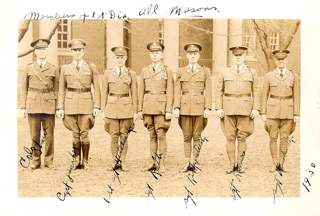|
Among the clearest distinctions in military service is the divide between officers and enlisted personnel. Soldiers, sailors, marines and airmen quickly learn the etiquette of military life, especially the standards that regulate conduct between ranks. The hierarchy of command also creates a social divide between the ranks by maintaining separate quarters, service clubs and social activities.

Military etiquette requires that an enlisted person salute an officer when passing or upon approaching an officer with the intent of conversing or receiving orders. Saluting is one of the most basic military courtesies, and its execution is a clear indicator of the rank relationships between uniformed personnel.
Despite its small size Fort Slocum separated officers and enlisted personnel by its organization of space, with officers quartered to the west of the Parade Ground, NCO families generally grouped east of the Post Chapel and the other enlisted personnel housed east of the Parade Ground. Protocol dictated that enlisted men not walk along the path in front of Officers’ Row, except when on a specific work detail.
Though some aspects of the social divide have loosened in the modern military, during the period when Fort Slocum was active, it was firmly observed, and interaction between the ranks was generally limited to the normal round of assignments and tasks within each unit or detachment.
The separation and formalities between ranks became second-nature to seasoned personnel. A soldier showed respect to the service by maintaining careful regard for military etiquette. Still, effectively observing separations of rank through etiquette required experience, for circumstances and custom often required careful calibration of behavior. Treating the rules too loosely made a soldier disrespectful; observing them too strictly made a martinet.
Family members of service personnel were not, strictly speaking, required to observe the etiquette of command and rank. Nonetheless, social and physical separations between the officer and enlisted ranks strongly shaped the attitudes, expectations and behavior of many civilian family members living at Fort Slocum. As kids residing on an army post, Bob Sisk and Rivka Olley were deeply influenced by the behavior and attitudes of their parents. But not all former Fort Slocum residents shared the same feelings or memories of the officer and enlisted divide. Some recalled that their fathers' ranks mattered little in the world of young people on post.
Military tradition dictated that the enlisted and officer ranks generally did not mix at social functions, nor did they socialize on their own. The establishment of separate clubs for officers and non-commissioned officers permitted each military grade to congregate for after-hours leisure without the discomfort of encountering personnel of very unequal status.
|




 Officer and Enlisted
Officer and Enlisted